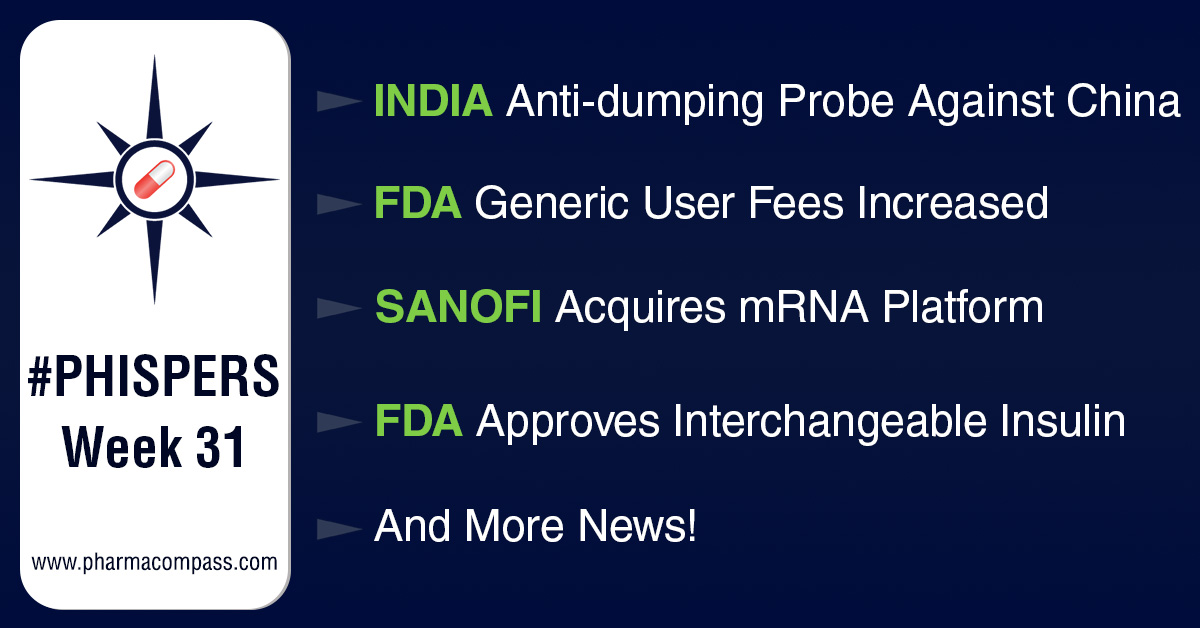
By PharmaCompass
2021-08-05
Impressions: 2339
This week, Phispers brings you an analysis of the generic drug user fee amounts for FY 2022 announced by the US Food and Drug Administration. The agency has increased the fee for ANDAs by nearly 15 percent.
In M&A news, Sanofi announced the acquisition of Translate Bio for US$ 3.2 billion. The buyout will strengthen Sanofi’s efforts in accelerating the application of mRNA technology in therapeutics and vaccines.
The FDA approved the first interchangeable biosimilar insulin product — Viatris’ Semglee, whose reference product is Lantus (insulin glargine), a long-acting insulin analog.
Buoyed by the safety issues confronting its rivals, AstraZeneca and Johnson & Johnson, Pfizer has raised the 2021 sales forecast for its Covid-19 vaccine by 29 percent to US$ 33.5 billion.
India initiated an anti-dumping probe against China over a key raw material used to make atorvastatin API, known as ATS-8. The probe is based on a complaint filed by Arch Pharmalabs.
And the FDA issued a warning letter to American drugmaker Syntec over GMP violations at its Farmingdale plant.
FDA increases user fees for FY 2022 under GDUFA II; ANDA fee up 15%
Last week, the US Food and Drug Administration (FDA) published the user fee amounts it will collect in FY 2022 from drug manufacturers and outsourcing facilities. The Generic Drug User Fee Act (GDUFA) is a law designed to speed access to safe and effective generic drugs to the public and reduce costs to the industry. The amended law — GDUFA II — directs the FDA to use the yearly revenue amount determined under the statute as a starting point to set the fee rates for each fee type.
In line with the trend seen last year, the agency increased the fee for ANDAs (abbreviated new drug applications) by nearly 15 percent and for DMFs (drug master files) by over 7 percent.
Last year, the fee for facilities — finished dosage form (FDF) as well as contract manufacturing organizations (CMOs) — had been reduced. But this year, the fee for FDF facilities, both domestic and foreign, has gone up by over 5 percent. The fee for CMOs, both domestic and foreign, has gone up by 5.97 and 4.8 percent respectively.
As was the case last year, the fee under the GDUFA program for large, medium and small-sized generic drug applicants have been reduced marginally.
|
FDA User Fee Table FY 2022 |
|||||
|
Generic Drug User Fee |
FY 2022 |
FY 2021 |
FY 2020 |
Change |
% change |
|
Applications: |
|||||
|
Abbreviated new drug application (ANDA) |
225,712 |
196,868 |
176,237 |
28,844 |
14.65 |
|
Drug master file (DMF) |
74,952 |
69,921 |
57,795 |
5,031 |
7.19 |
|
Facilities: |
|||||
|
Active pharmaceutical ingredient (API) – Domestic |
42,557 |
41,671 |
44,400 |
886 |
2.13 |
|
API – Foreign |
57,557 |
56,671 |
59,400 |
886 |
1.56 |
|
Finished dosage form |
195,012 |
184,022 |
195,662 |
10,990 |
5.97 |
|
FDF – Foreign |
210,012 |
199,022 |
210,662 |
10,990 |
5.52 |
|
Contract manufacturing |
65,004 |
61,341 |
65,221 |
3,663 |
5.97 |
|
CMO – Foreign |
80,004 |
76,341 |
80,221 |
3,663 |
4.8 |
|
GDUFA program: |
|||||
|
Large size operation generic drug applicant |
1,536,856 |
1,542,993 |
1,661,684 |
-6,137 |
-0.398 |
|
Medium size operation generic |
614,742 |
617,197 |
664,674 |
-2,455 |
-0.398 |
|
Small business operation generic drug applicant |
153,686 |
154,299 |
166,168 |
-613 |
-0.397 |
Funding
boost for FDA: The Senate Appropriations subcommittee that
oversees funding for the FDA advanced a bill that would give a US$ 200 million boost in budget
authority to the agency in FY2022. The total funding for the FDA under the
proposed legislation is US$ 3.414 billion, roughly 6 percent higher than the
agency’s budget authority for FY2021. However, the Senate proposal is lower than the US$ 3.471 billion allocated to the FDA under the appropriations bill that was passed in the House last week. The House bill represents a US$ 257 million funding increase for the agency over the previous year. However, both these funding increases for the FDA proposed under both chambers’
bills is less than
the US$ 343 million increase called for in President Joe Biden’s budget request.
Sanofi acquires Translate Bio for US$ 3.2 billion for its mRNA tech platform
In April this year, Sanofi acquired Tidal Therapeutics, a pre-clinical stage biotech company with a novel messenger RNA-based approach for in vivo reprogramming of immune cells. Following this, in June, the French drugmaker launched a dedicated vaccines messenger RNA (mRNA) Centre of Excellence. And this week, as part of its endeavor to accelerate the application of mRNA technology for developing therapeutics and vaccines, the company acquired Translate Bio, a clinical-stage mRNA therapeutics company. The mRNA approach instructs human cells to make specific proteins that produce an immune response to a given disease.
Under the terms of the agreement, Sanofi will acquire all outstanding shares of Translate Bio for US$ 38.00 per share in cash, which represents a total equity value of approximately US$ 3.2 billion (on a fully diluted basis). The boards of both Sanofi and Translate Bio have unanimously approved the transaction, a company statement said.
Sanofi’s CEO Paul Hudson said, “Translate Bio adds an mRNA technology platform and strong capabilities to our research, further advancing our ability to explore the promise of this technology to develop both best-in-class vaccines and therapeutics”.
In June 2019, the two drugmakers had entered into a collaboration and exclusive license agreement to develop mRNA vaccines. The agreement was further expanded in 2020 to broadly address current and future infectious diseases. There are two ongoing mRNA vaccine clinical trials under the collaboration — the Covid-19 vaccine Phase 1/2 study with results expected in Q3 2021 and the mRNA seasonal influenza vaccine Phase 1 trial with results due in Q4 2021.
FDA approves first interchangeable biosimilar insulin product — Viatris’ Semglee
Last week, the US Food and Drug Administration (FDA) approved the first interchangeable biosimilar insulin product, indicated to improve glycemic control in adults and pediatric patients with Type 1 and Type 2 diabetes mellitus. Semglee (insulin glargine-yfgn) is both biosimilar to, and interchangeable with (can be substituted for), its reference product Lantus (insulin glargine), a long-acting insulin analog.
Semglee has been developed by Viatris Inc and Biocon Biologics (a subsidiary of Indian drugmaker Biocon Ltd) and provides diabetes patients with a safe and potentially cost-effective option for treating diabetes. A biosimilar is a biological product that is highly similar to, and has no clinically meaningful differences from, a biological product already approved by the FDA (also called the reference product).
Many diabetes patients depend on insulin to manage their disease, but find the drugs to be expensive, particularly in markets like the US. This makes lower-cost biosimilars an attractive alternative. In the US, most biosimilars carry 15 to 35 percent lower initial list prices than comparative list prices of the reference products.
“This is a momentous day for people who rely daily on insulin for treatment of diabetes, as biosimilar and interchangeable biosimilar products have the potential to greatly reduce healthcare costs,” said acting FDA commissioner Janet Woodcock. “Today’s approval of the first interchangeable biosimilar product furthers FDA’s longstanding commitment to support a competitive marketplace for biological products and ultimately empowers patients by helping to increase access to safe, effective and high-quality medications at potentially lower cost.”, she added.
Pfizer raises 2021 sales forecast for its Covid-19 vaccine to US$ 33.5 billion
Last week, Pfizer raised the 2021 sales forecast for its Covid-19 vaccine by 29 percent to US$ 33.5 billion. The US drugmaker splits expenses and profit 50-50 with its German partner — BioNTech.
Pfizer has secured new orders because its rivals (such as AstraZeneca and Johnson & Johnson) are confronting manufacturing and safety hurdles.
Pfizer plans to make 3 billion doses this year, out of which 2.1 billion doses have been committed to various countries. The company says it has shipped over 1 billion doses since December.
The drugmaker has also been stressing on the fact that people will need a third dose of the mRNA vaccine to keep protection against the virus high. However, the World Health Organization (WHO) is calling for a moratorium on Covid-19 vaccine boosters until at least September-end. The move is to enable that at least 10 percent of the population of every country is vaccinated, WHO Director-General Tedros Adhanom Ghebreyesus said this week. However, the White House said on Wednesday that it is prepared to provide Covid-19 booster shots, if needed, suggesting it would not heed the call by the WHO.
Pfizer, on the other hand, has said it could apply for an emergency use authorization (EUA) for a booster dose as early as this month. According to the drugmaker, a third dose generated virus-neutralizing antibodies more than five times higher in younger people and more than 11 times higher in older people than antibodies from two doses against the Delta variant of the virus.
The company also posted a non-peer reviewed study last week that said the vaccine’s efficacy declines over time. It had dropped to around 84 percent effectiveness from a peak of 96 percent four months after the participants received their second dose.
Next month, Pfizer and BioNTech plan to test a version of the vaccine specifically designed to take on the fast-spreading Delta variant, with the first batch already manufactured.
Pfizer, Moderna raise prices in Europe: Under a new supply deal, both Pfizer and Moderna have increased the price of their mRNA-based Covid-19 vaccines in Europe. According to a report published in the Financial Times, Pfizer’s vaccine will now cost US$ 23.07 (€19.50) per dose, up from US$ 18.34 (€15.50). Moderna has revised the price to US$ 25.50 per dose, up from US$ 22.60 in the first procurement deal but lower than a previously agreed US$ 28.50.
Pfizer’s latest supply deal with the EU will see the company deliver 1.8 billion doses of its vaccine until 2023. Pfizer and BioNTech aim to start providing Europe with 900 million doses in December 2021, with Europe having the option to receive up to 900 million additional doses in the future.
India initiates anti-dumping probe against China over chemical used to make atorvastatin
Arch Pharmalabs, an Indian API, intermediate and generic drug manufacturer, has filed a complaint with the country’s Directorate General of Trade Remedies (DGTR), seeking initiation of an anti-dumping probe over imports of a key raw material from China.
Known as ATS-8, the chemical is widely used to manufacture the active pharmaceutical ingredient, atorvastatin. Atorvastatin drug formulations are used to treat excess cholesterol in the blood that increases the danger of developing cardiovascular diseases.
On receiving this complaint, the Indian government has initiated an anti-dumping investigation into the alleged dumping of “ATS-8” from China. Arch Pharmalabs has alleged that the dumping of the product has impacted the industry.
“On the basis of the duly substantiated written application by or on behalf of the domestic industry, and having satisfied itself, on the basis of the prima facie evidence submitted about the dumping, the DGTR has initiated the investigations,” a government notification said.
Under the multilateral regime of the World Trade Organization, countries can start anti-dumping probes to determine whether their domestic industries have been hurt because of a surge in cheap imports. If proven, they can impose anti-dumping duties as a countermeasure.
FDA issues warning letter to American firm Syntec over GMP violations at its NY site
The US Food and Drug Administration (FDA) has issued a warning letter to New York-based pharmaceutical manufacturer Syntec for a series of good manufacturing practice (GMP) non-compliance issues. The agency says these pertain to how the company handles active pharmaceutical ingredients (APIs), which in turn compromise the safety of the drugs produced at the site.
The key problems cited by the FDA at the company’s Farmingdale (New York) site were inadequate contamination safeguards, as well as neglectful cleaning and testing procedures.
Syntec was storing both Lomustine and human chorionic gonadotrophin (HCG) at room temperature instead of storing it at refrigerated temperatures (as required by the manufacturer), says the warning letter. Lomustine is a highly potent cytotoxic chemotherapy agent, making the risk of degradation from the too-warm temperatures particularly concerning.
During the inspection, Syntec denied repackaging Lomustine, though records indicated otherwise. After being called out by the FDA investigators, the firm acknowledged “occasionally” performing repackaging, while not specifically remembering its Lomustine repackaging activity.
The firm also kept weed killer, engine antifreeze coolant, and dry wall repair products in the same room with APIs, thus compromising their safety. FDA inspectors also found that personal food items and unidentified products in unlabeled aluminum bags were commingled with APIs and other chemicals in the refrigerator where APIs and chemicals were stored.
“The drugs distributed by your firm were at risk for contamination and other hazards to drug safety because you failed to appropriately design your facility, establish effective procedures, maintain records for your activities, and implement robust controls,” wrote the FDA.
In its initial response to the inspection findings, Syntec said it planned to separate cytotoxic compounds, beta-lactams, other potent compounds and APIs into four separate areas by using separate shelves for the storage of each type of drug. The FDA said this response was insufficient because the firm failed to provide an appropriate corrective action and preventive action (CAPA) plan for preventing cross-contamination and other mix-ups.
The PharmaCompass Newsletter – Sign Up, Stay Ahead
Feedback, help us to improve. Click here
Image Credit : Phisper Infographic by SCORR MARKETING & PharmaCompass is licensed under CC BY 2.0
“ The article is based on the information available in public and which the author believes to be true. The author is not disseminating any information, which the author believes or knows, is confidential or in conflict with the privacy of any person. The views expressed or information supplied through this article is mere opinion and observation of the author. The author does not intend to defame, insult or, cause loss or damage to anyone, in any manner, through this article.”







